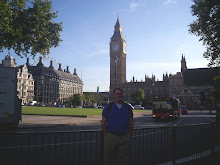Tomorrow voters all across the United Kingdom of Great Britain and Northern Ireland will go to the polls and vote. Voters will vote for their local MP and the party that means a majority of seats forms the next government. To help follow the election, here are some of the seats that whose results I will be watching for. Some of these are bellwether and threshold constituencies that will give hints about the trend in the election and some of these are constituencies that I am just interested in. Much of my understanding comes from the good people at
ukpollingreport.
The first seat to watch is
Houghton and Sunderland South. This constituency, when it was known as Sunderland South, was the first to declare the winner and did so every election since 1992. Chris Mullin, the outgoing MP, used to joke about forming his own government during the brief minutes when he was the only elected member of Parliament.
Based on uniform nation swing, Labour will lose its majority if they lose
Stourbridge. If the Conservatives win in
Dudley South then they will be in the largest party in the Commons and if the Tories are victorious in
Derby North then they are assured a majority.
If you are looking for some Bellwether seats then look to see who wins
Dartford and
Chorley. The winning party has won both of the these seats since 1964.
Luton South, and its predecessor seats, are the most reliable bellwether seats. The victorious party has won this seat in every election since 1951.
Since all 3 major parties are significant players in this election there are 3 seats in which all 3 parties poll within 10% of each other.
Ealing Central and Acton,
Watford, and
Filton and Bradley Stoke are the seats to watch get an idea of which of the three parties can expect to have a good night.
Since ministers are member of Parliament, most general elections see a minister or two lose their seats. The Scottish Secretary Jim Murphy in
East Renfrewshire and Chancellor of the Exchequer Alistair Darling in
Edinburgh Southwest are both considered somewhat vulnerable. However, the most likely to lose their seat is the Minster of Culture, Sports, and Media Ben Bradshaw in Exeter and Children, Families, and Schools minister Ed Balls(who is a close ally of Gordon Brown) in
Morley and Outwood. Two former Home Secretaries could also lose their seats. Jacqui Smith in
Redditch will almost certainly lose her seat and Charles Clarke in
Norwich South could be vulnerable.
I am also interested in seeing if the Green Party can win in
Brighton Pavilion and win their first ever seat in Parliament. As Speaker, John Bercow is a non-partisan figure and the major parties don't run candidates against a sitting speaker. However the UK Independence Party is running against Speaker Bercow in the traditional Tory seat of
Buckingham. I am also watching to see if the Tories can win back Margaret Thatchers old seat of
Finchley and Golders Green.
Finally, I am interested in Penrith and the Border because former army officer, diplomat, best selling writer, Harvard don, and critic of U.S. and UK efforts in Afghanistan and Iraq Rory Stewart is the Conservative candidate and the heavy favorite to win.
Enjoy election day and I hope to join you some tomorrow night to share some of my immediate observations.
